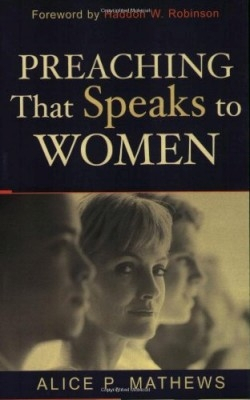Preaching That Speaks to Women
“I grew up in an era in which making wisecracks about women was fairly standard preaching fare, good for a few laughs,” writes the author in her introduction. Although such jokes may no longer be “standard fare” in most pulpits, Mathews argues that many Christian preachers inadvertently alienate the women in their congregations by failing to address their perspectives and needs.
When it comes to preaching, Mathews knows whereof she writes, both as a listener and as a speaker. She holds a Ph.D. in religion and social change, is associate professor of educational ministries and women’s ministries at Gordon-Conwell Theological Seminary, and has served as a missionary, teacher, and seminary dean. Her experience in the church and the academic world has exposed her to many myths and
destructive assumptions about gender that prevent speakers from effectively reaching female listeners, and prevent women from realizing their full potential in Christ.
Mathews organizes her discussion around the “Great Commandment,” the biblical mandate to love God with all one’s heart, soul, mind, and strength (Luke 10:27). Noting that the heart is considered by many the seat of the “moral will,” Mathews discusses men’s and women’s paths to moral decision-making, describing women’s tendency to rely more on relationships and context when making ethical choices. She encourages preachers to help women love God with all their souls, explaining relevant psychological differences between men and women, including issues of stress management, self-esteem, depression, communication styles, and gender stereotyping.
The author asserts that, in order to help listeners love God with their minds, preachers should consider their listeners’ epistemologies, their “basic assumptions about the nature of truth and reality and … the origins of knowledge.” Mathews argues that teaching women to love God with all their strength requires understanding how many women view issues of power and leadership. Finally, she outlines a few commonly accepted stereotypes about gender roles that can wound and alienate female listeners.
Mathews’ careful academic style, including her use of an impressive range of religious and secular sources, gives her arguments and insights a great deal of weight. She approaches the potentially explosive topic of gender relations within the church with a clear-eyed rationality that will draw in and challenge both male and female readers. While this book is a valuable resource for pastors, teachers, and evangelists desperate to impact people’s lives with the Gospel, it can also help lay Christians to better love their neighbors by prompting them to thoughtfully consider the spiritual needs of those unlike themselves.
Disclosure: This article is not an endorsement, but a review. The publisher of this book provided free copies of the book to have their book reviewed by a professional reviewer. No fee was paid by the publisher for this review. Foreword Reviews only recommends books that we love. Foreword Magazine, Inc. is disclosing this in accordance with the Federal Trade Commission’s 16 CFR, Part 255.

